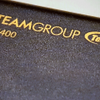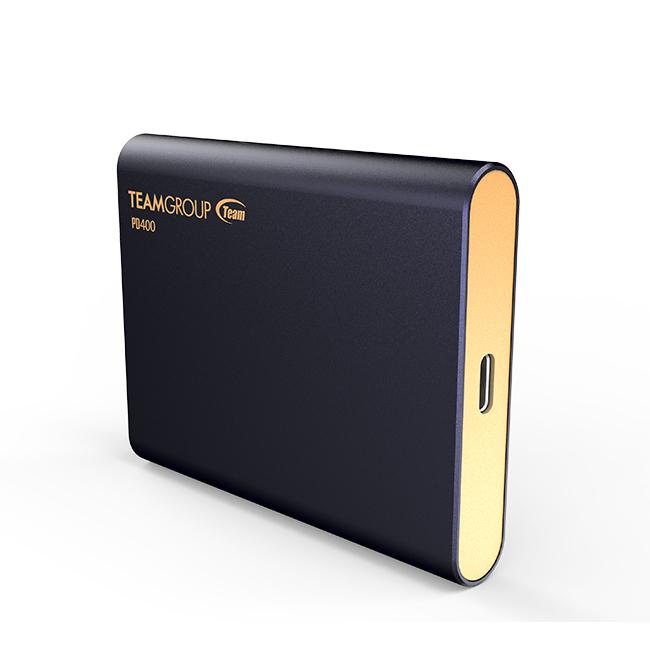Introduction
Team Group PD400 Portable SSD review
Team Group is a Taiwan based vendor who mainly specializes in memory and SSDs, with their 'T-Force' line of products being their 'premium' gaming brand. We have previously looked at this premium line of products before at Guru3D. More specifically, it was some RGB memory made alongside Asus' 'TUF' line of products. It was a very good kit, from... memory. Sorry. Portable SSDs are definitely not a new thing, with Samsung - to my mind - bringing the first portable SSD to market in 2015, with the T1. Since then, portable drives have flooded the consumer tech space. Add to this the advent of super-fast interfaces like USB 3.2 Gen 2 x 2, capable of achieving transfer rates of up to 20Gbps.
Team Group's new PD400 portable SSD comes in sizes of 240, 480, and 960GB. Today, we have the middle capacity example on show. The devices offer connectivity via USB-C at the SSD end, with included (and braided, thank you) USB-C to USB-A or C to C cables giving you options in how you interface your device. That said, the actual interface is only USB 3.1 Gen 1, meaning a maximum of 5Gbps in terms of throughput. This limitation puts the PD400 behind Team Group's own PD700, which offers the same connectivity, but via 10Gbps USB 3.1 Gen 2. In fact, before we start a small compare of what interfaces the PD400's competitors bring to the fight, shall we talk pricing? The 480GB version of the PD400 is (as of 18/08/19) listed on Amazon UK for £57.32. Samsung's T5 drive (often touted as an industry leader, appropriate from the company that gave us the much loved 'Evo' line, as well as the newer 'QVO' series) is... RRP of £178.74. Note that I think this is an anomaly, as other vendors have the T5 for closer to $100 USD. To find one final example, we turn to Seagate, who have a product in the form of their 'Fast SSD', which we have previously reviewed on this website, linked here here. Whilst about to win no awards for originality of naming, the 500GB version of the drive can be had from Amazon UK for an RRP of £92.99.
Immediately, this makes things more than a little interesting. The PD400 comes to this fight packing support for USB 3.1 Gen 1, i.e. 5GBps transfer. The Samsung drive outclasses it, offering USB 3.1 Gen 2 @ 10Gbps. The Seagate, to be fair, is also restricted to 5Gbps USB 3.1 Gen 1. Pricing aside, if I were a non-tech-savvy consumer with money to burn, and I saw 'bigger numbers' in both aspects, I know which one I would buy. For the security-conscious amongst you, the T5 also offers AES-256 bit encryption, whereas the PD400 offers no such ability.
What about raw performance? Well, we shall - naturally - be conducting tests with regard to raw numbers later on in this review. Usually - in order to flatter the product as much as possible - manufacturers of SSDs are more than happy to prominently display their drives' read/write performance as 'prime to view' numbers. Team Group claim 430 MB/s (read) and 420MB/s (write), which is - as some may not know - a whole chunk lower than what is claimed by Samsung's T5. If the numbers for sequential read & write are nearly at the 400 mark, then I really have to wonder what we will see in the other batch of tests we are going to study? The drive comes with a standard 3-year limited warranty, as well as support for Windows 7 through to 10, MacOSX (not officially listed, but it worked fine on a 2018 MacBook Pro running OS Mojave 10.14.16), as well as Android 5.0 and upward. It has a very, very attractive all metal construction in dark blue, and weighs in bang on at 100g. It's also diminutive, measuring 83.1 x 65.5 x 13.2mm. Then again, point me in the direction of a portable SSD that isn't all these things? They do, for the most part, all tend to follow the same design philosophy. Sleek, small, light, and very minimalistic... though I wouldn't put it past Corsair to put out an RGB portable SSD. The drive comes with no software, unlike Seagate's previously reviewed kit, or Samsung's T5/WD's My Passport SSD. It would have been nice to have some form of software allowing easy encryption and/or monitoring, but I guess that is what 3rd party tools are for. Team Group, therefore, doesn't lose any points here, but they certainly don't gain any. Next, I will move onto some of the more detailed features & specifications of the drive, before we then get onto the good stuff.


